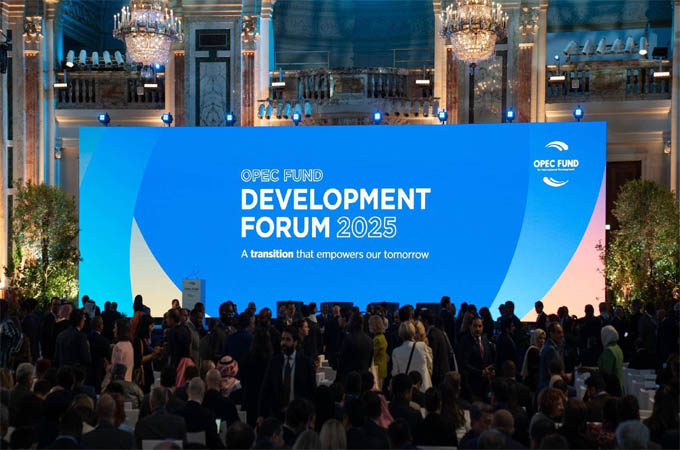The fourth Opec Fund Development Forum, held in Vienna, Austria, concluded with a strong slate of new commitments, loan agreements, and strategic partnerships to advance inclusive transition and sustainable development. The forum brought together more than 700 global leaders, including government representatives, development institutions, and private sector stakeholders, under the theme “A Transition That Empowers Our Tomorrow.”
The Opec Fund announced approximately $720 million in new financing to support development efforts across Africa, Asia, Latin America, and the Caribbean, including $362 million in new loan agreements, reported SPA.
A new Trade Finance Initiative was also launched to secure vital supplies and help close trade-related liquidity gaps in partner countries. As part of its Small Island Developing States (SIDS) initiative, the Opec Fund signed cooperation agreements with Grenada and the Solomon Islands to expand support for climate resilience and sustainable infrastructure.
New country-level agreements included a $212 million loan agreement with Oman to finance the Khasab–Daba–Lima Road Project (Sultan Faisal bin Turki Road), which will improve local and regional connectivity.
The agreement also introduced a Country Partnership Framework (CPF) to guide cooperation over the next five years. Another key agreement was a $25 million loan with Cameroon to support the Rice Value Chain Development Project. This project aims to strengthen smallholder farmers and food security in vulnerable regions, in collaboration with the Islamic Development Bank (IsDB), the Arab Bank for Economic Development in Africa (BADEA), and the Kuwait Fund.
The forum also marked the signing of a CPF with Rwanda, allocating up to $300 million in financing from 2025 to 2028. This framework supports Rwanda’s development priorities, including infrastructure improvement, enhanced essential services, and the promotion of entrepreneurship and private sector growth.
Further partnership frameworks were established with Azerbaijan to support infrastructure, energy transition, and sustainable development, and with Botswana to promote infrastructure, renewable energy, innovation, digital transformation, and export-led private sector growth.
Agreements with Grenada and the Solomon Islands will help build climate resilience and advance sustainable development goals. Meanwhile, the Kyrgyz Republic entered discussions to increase cooperation in the sectors of transport, water supply and sanitation, energy, agriculture, and banking.
The Opec Fund also reinforced its commitment to private sector-led growth by signing targeted financing agreements with financial institutions across Africa. In Côte d’Ivoire, a €30 million loan was signed with Coris Bank International Côte d’Ivoire, and a €35 million loan with NSIA Banque.
Both agreements aim to facilitate access to finance for small and medium-sized enterprises (SMEs). A $40 million loan agreement with the East African Development Bank (EADB) was also concluded to boost economic investments in Kenya, Uganda, Tanzania, and Rwanda, enhancing regional integration and inclusive growth.
At the forum, the Opec Fund launched a new Trade Finance Initiative to bolster trade resilience by ensuring access to essential imports, closing liquidity gaps, and mitigating external shocks in vulnerable economies.
The forum also included the signing of new cooperation agreements to strengthen multilateral partnerships.
An agreement with the Central American Bank for Economic Integration (CABEI) will support projects in infrastructure, energy, and human development across the Latin American and Caribbean regions.
Another agreement with the Islamic Organisation for Food Security (IOFS) aims to coordinate efforts on climate-resilient agriculture and sustainable food systems.
A third agreement with the International Anti-Corruption Academy (IACA) will support training programs designed to promote institutional transparency and enhance anti-corruption capacity in partner countries.
Opec Fund President Abdulhamid Alkhalifa emphasised that the forum delivered tangible results, with new signings, partnerships, and approaches that empower partner countries to transform ambition into action across sectors such as energy, infrastructure, agriculture, and finance.































